World leaders are failing ordinary people on climate change. From Fairbourne in Wales to China and Japan; the Amazon and Congo rainforests to the Pacific Islands – here are some of the people our leaders should be listening to at the COP26 global climate talks.
World leaders are meeting this week at the COP26 climate conference in Glasgow to agree stronger pledges to stop the world warming to dangerous levels.
But a UN report has just warned that the world is on track for a disastrous temperature rise of 2.7°C by the end of the century – well above the goals of the Paris climate agreement.
Leadership failure on climate change will affect everyone on Earth. For the most affected people and areas around the world, it already has – but these people are often excluded from the conversation. Here are the voices world leaders should be listening to at COP26.
Sônia Guajajara
“A system change is urgently needed to deal with the global climate crisis! By guaranteeing the rights of Indigenous Peoples, a healthy future for all of humanity is also guaranteed! Without climate justice and greater ambition by countries, we will not move forward with solutions.”
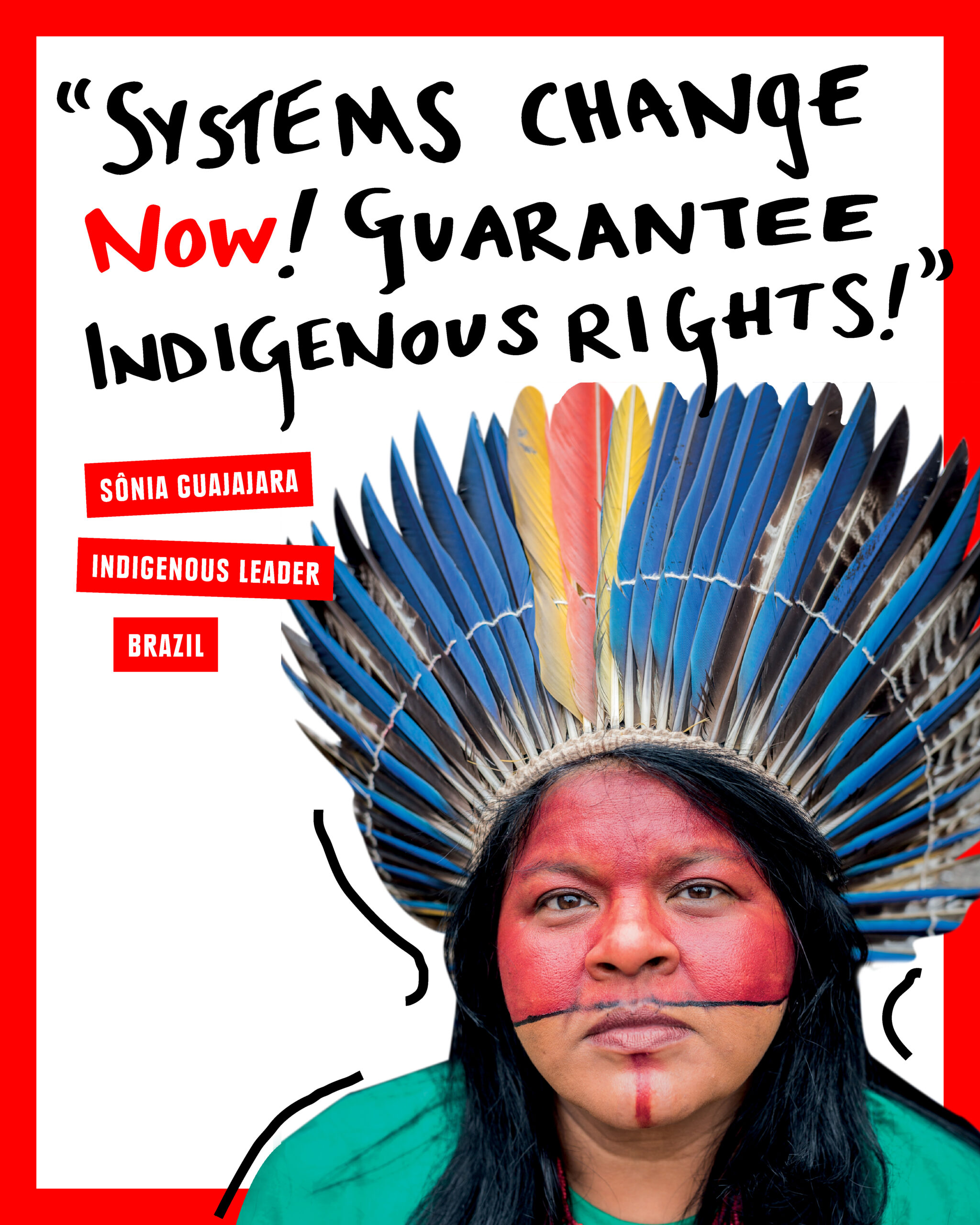 Sônia Guajajara is the leader of APIB – the Articulation of Indigenous Peoples of Brazil, an Indigenous activist, environmentalist and politician.
Sônia Guajajara is the leader of APIB – the Articulation of Indigenous Peoples of Brazil, an Indigenous activist, environmentalist and politician.
“My people, like most Indigenous Peoples in Brazil, have lived through the most insidious period of aggression against our rights and our lives. The attacks come from all sides, but mainly from the Brazilian state, led by a cruel ecocidal and genocidal president. We feel it under our skin – the effects of the destruction of our lands and the loss of rights which we gained through decades of struggle.
“The world definitely needs to understand that we, Indigenous Peoples, are the true guardians of the forests. There is no solution to the environmental crisis that does not involve amplifying our voices in all spaces. We need our lands to be protected from all greed, as they are a reserve of the future.
“Without Indigenous land there is no life, therefore there is no future.”
Find @soniaguajajara on Instagram.
Winnie Cheche
“To all our leaders: stop the exploitation of green spaces and forests. We need the required forest cover attained, surpassed, and most importantly, protected.”
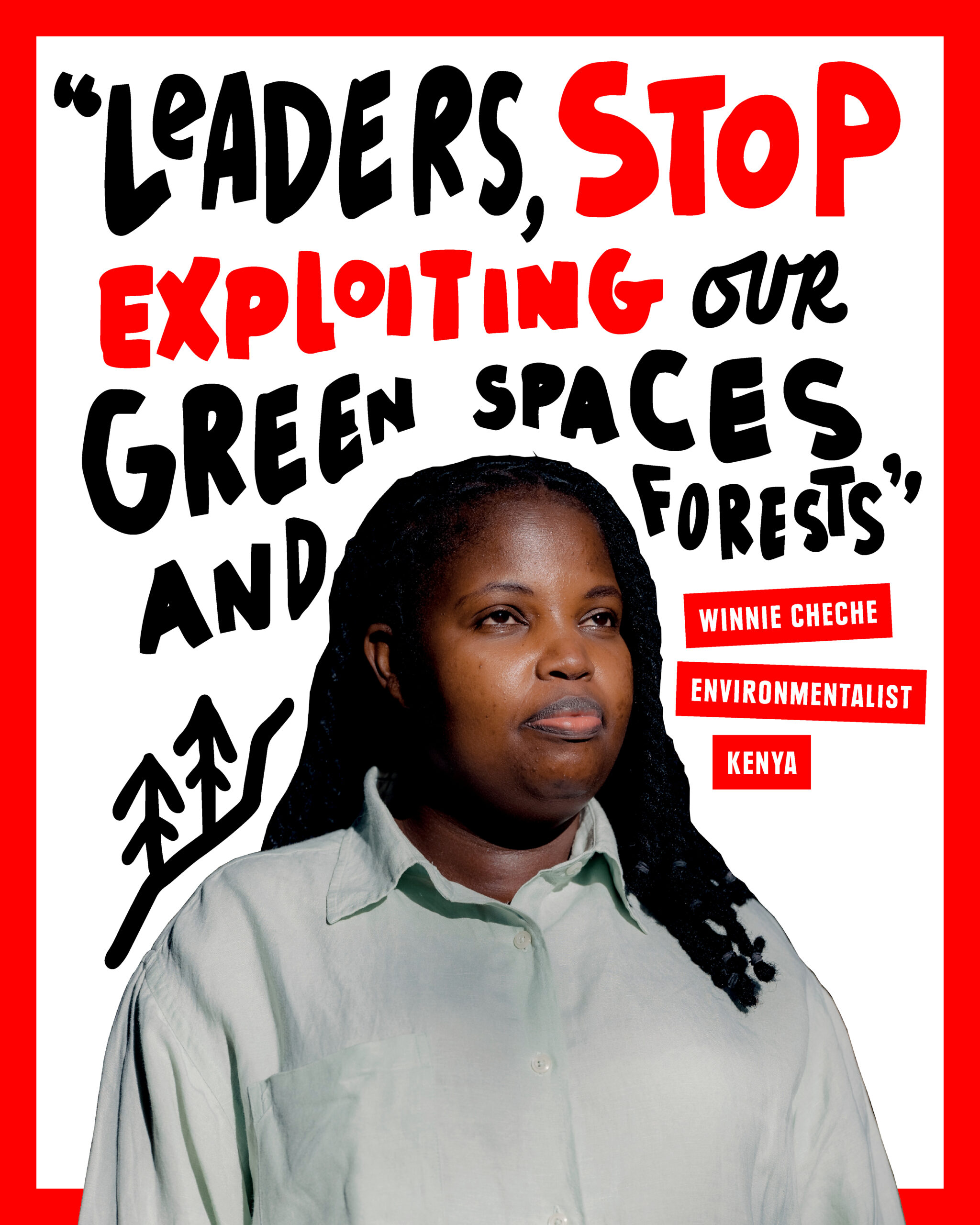 Winnie Cheche is an environmentalist working with different groups on climate change in Kenya.
Winnie Cheche is an environmentalist working with different groups on climate change in Kenya.
“In Kenya we have been experiencing floods, droughts, and landslides. With the unpredictable weather patterns due to climate change, farming continues to be difficult, risking our food security and livelihoods. These natural disasters have also pushed people – especially pastoralists’ communities – to move to other places where there are farms, leading to conflicts due to scarce resources. In arid and semi-arid areas, basic needs have become a luxury.
“With limited resources and not being heard, it sometimes feels like a lost war already. The Global South contributes the least, yet is most affected. Support us to push the Global North to be responsible and play its part in the fight against climate change.”
Find Winnie Cheche on Instagram and Twitter, or through her website.
Helena de Carlos
“Leaders: no more excuses. During this pandemic you have shown you can act in a crisis.”
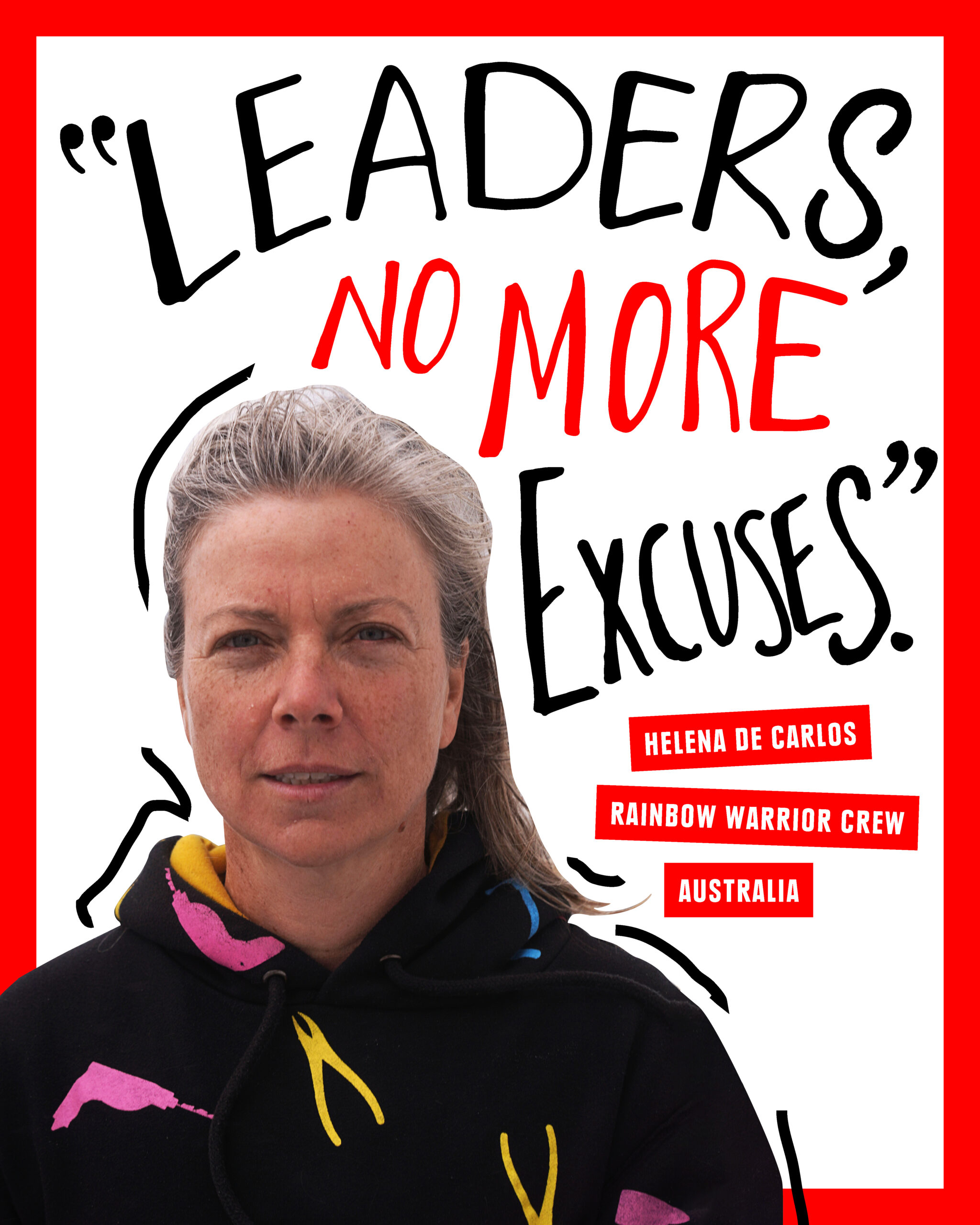 Helena de Carlos is a crew member on the Rainbow Warrior, one of Greenpeace’s three ships, from Australia.
Helena de Carlos is a crew member on the Rainbow Warrior, one of Greenpeace’s three ships, from Australia.
“Climate change ,while not directly triggering Australia’s bushfires, is increasing the impact of our bushfire season – a season that is now starting earlier, lasting longer and becoming more unpredictable. Another devastating impact is the potential loss of the Great Barrier Reef. Severe coral bleaching events are destroying large areas of the reef. Our Pacific colleagues are already feeling the impacts of sea level rise and stronger cyclones.
“As crew members on Greenpeace ships we take part in a wide variety of Greenpeace climate actions and campaigns around the world. Closer to home many in my community are demanding the government and companies divest and move away from coal and towards renewables. Greenpeace Australia is pushing for AGL, one of Australia’s largest electricity providers, to move away from coal and for companies to commit to 100% renewables by 2030.
“Australians need to pressure their politicians to take climate change seriously and not keep bending to the coal and fossil fuel lobby. Join local groups. Take to the streets.”
Kanahus Manuel
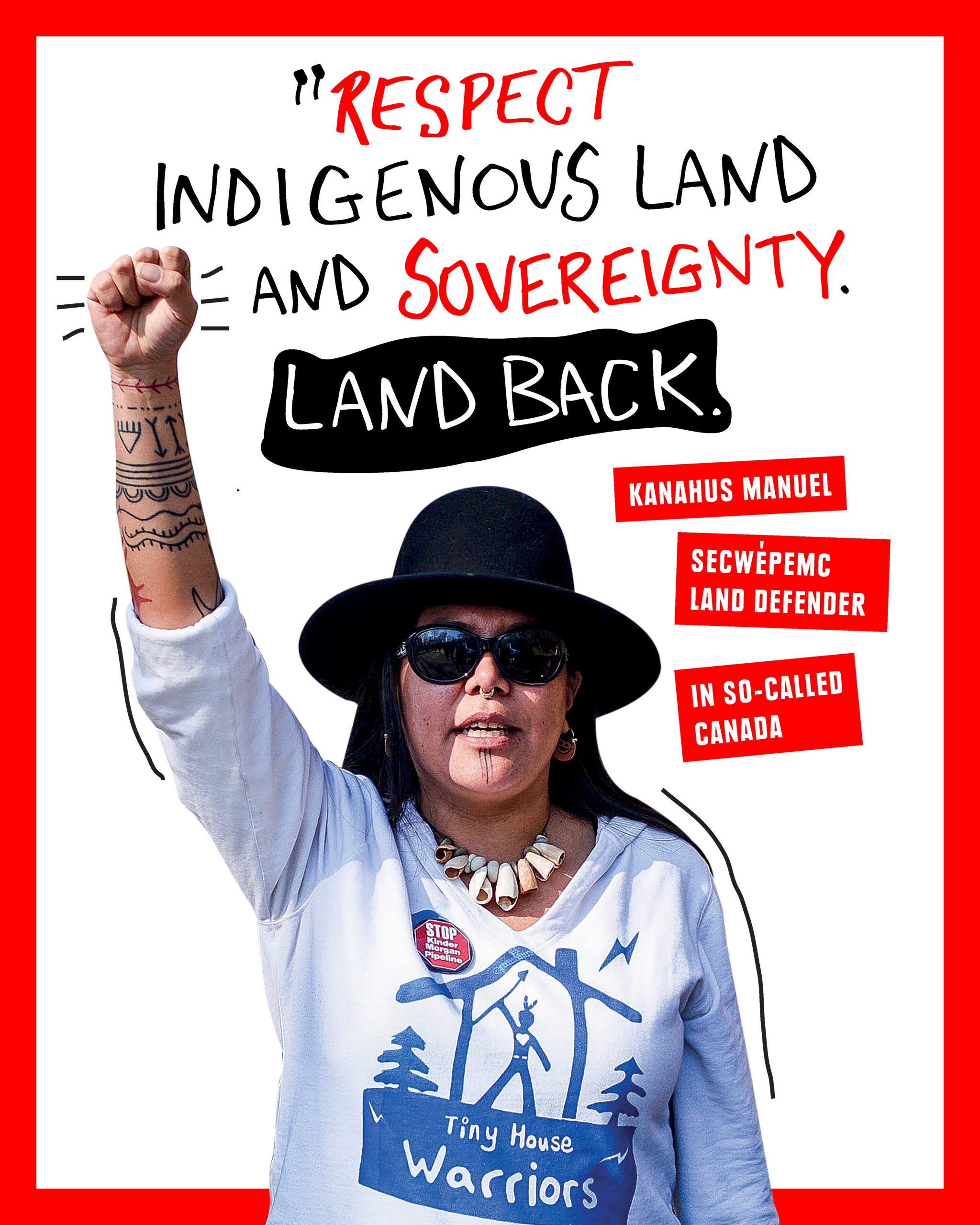 Kanahus Manuel is an Indigenous Land Defender. Follow her on Twitter or Instagram.
Kanahus Manuel is an Indigenous Land Defender. Follow her on Twitter or Instagram.
“The Trans Mountain expansion is a project to build a new pipeline between Alberta and the British Columbia coast, tripling the amount of polluting tar sands oil carried along this route. This destructive pipeline aims to cross 518km of uncededSecwepemc Territory.
“The Tiny House Warriors: Our Land is Homeproject is a part of a mission to stop the Trans Mountain pipeline from crossing Secwepemc Territory. The pipeline is a serious threat to our territories. An inevitable spill puts not just land but more than 1,000 waterways under threat, jeopardising drinking water and salmon-spawning grounds.
"We have never provided and will never provide our collective free, prior and informed consent– the minimal international standard – to the Trans Mountain Pipeline Project. This pipeline risks too much, enriching so few at the expense of so many.
“Ten tiny houses will be built and placed strategically along the pipeline route to assert Secwepemc Law and jurisdiction and block access to this pipeline. The Tiny House Warrior movement is the start of re-establishing village sites and asserting our authority over our unceded Territories. Each tiny house will provide housing to Secwepemc families facing a housing crisis due to deliberate colonial impoverishment. Each home will eventually be installed with off-the-grid solar power. We have built six and are just four houses away from our goal of ten. Each costs between CAD$25000–40,000 to build. Your support will help us reach our goal in the face of the legal costs that have resulted from our unwavering commitment to the land, the language and the culture of our people.”
Charles Baldaia
“Leaders try to tackle issues that concern us without including us in the decision-making. It’s not about us without us.”
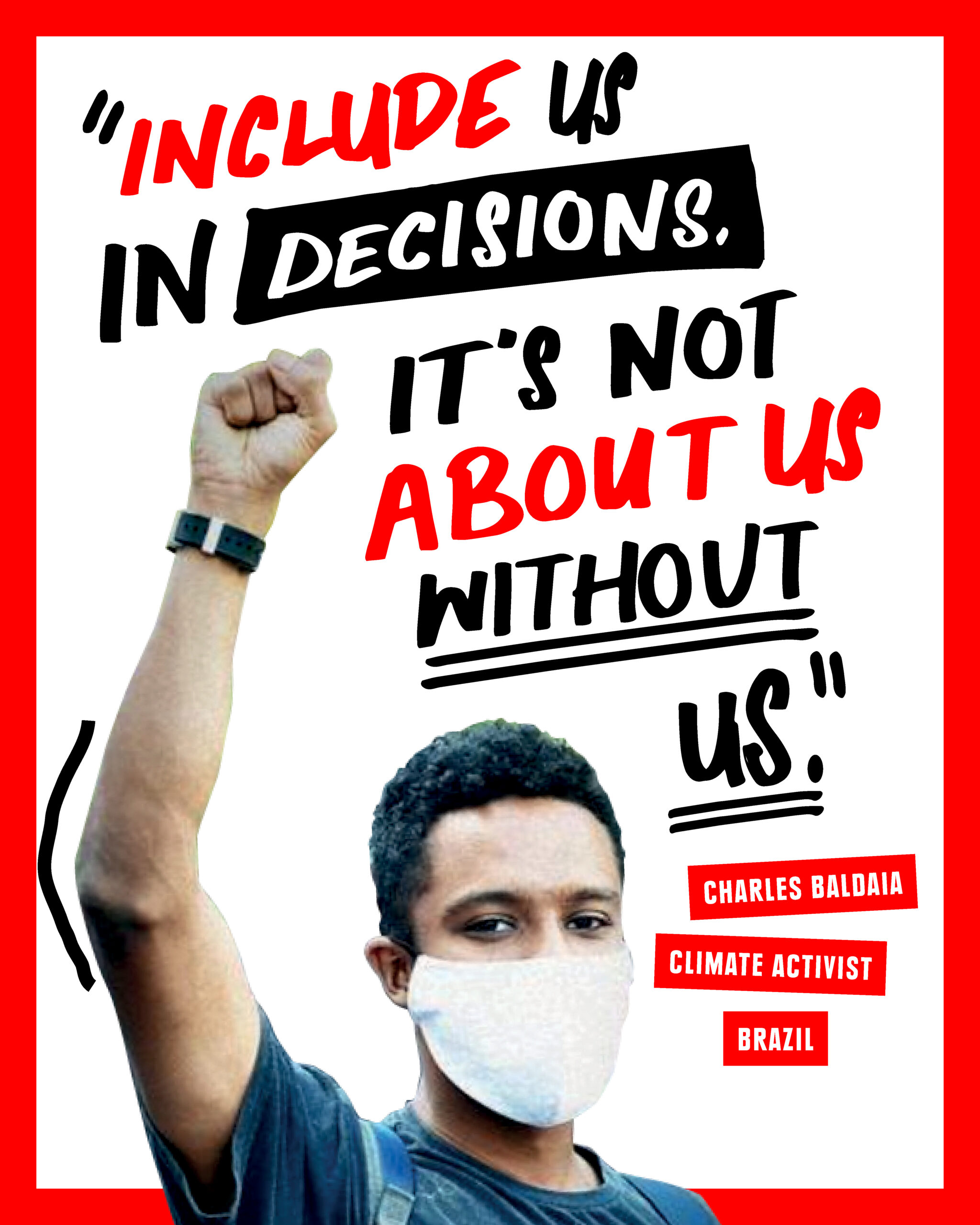 Charles Baldaia is a climate justice activist and international economics analyst from Parque São João Favelas in Brazil.
Charles Baldaia is a climate justice activist and international economics analyst from Parque São João Favelas in Brazil.
“It is not possible to disassociate climate justice from social justice. Rainfall in 2021 was the lowest in Brazil in more than a decade. As hydroelectricity is the most common energy source for Brazilians, the shortage of water in the reservoirs severely increases the risk of economic disruption from blackouts. This is the result of the Amazon rainforest fires in 2019 destabilising the flow of water from the Amazon region to where the reservoirs are located. This crisis raised the price of electricity, affecting the poorest more.
“Communities are very different and the specifics are better addressed by people who live together and understand their own problems. This knowledge is essential for applying solutions that will have a real impact on the lives of millions of people. Help us access the debate.”
Find Charles Baldaia on Instagram.
“We are asking that the agro-industrial companies in our forests actually improve our living conditions and really keep their promises. World leaders should take care of this because our wellbeing depends on it.”
“A company named Sudcam took almost all of our forest. We have to travel more than 20km to find food to eat. For some time now, we have noticed that fish that we catch have wounds on their body. We don’t know what is happening! We do not have drinking water; what we use is being polluted and we are at risk of diseases and death. We are now struggling to share the remaining small forest with people from Djoum’s communities. We sometimes fetch drinking water in the neighbouring villages, but we cannot do that all the time. We currently drink polluted water while waiting for things to change.
“We make sure to talk to local authorities and NGOs about our problems when we have such an opportunity. We hope that changes will come.
“Help us to end all this. The life of Baka communities is in the forest. We are lost without the forest!”
“I have lots of family in Bangladesh, which is already badly impacted by climate change. Our village suffered severe unseasonal flooding in 2019 due to climate change when the harvest was taken, leaving them without food or rice to plant. Bangladesh is predicted to be the country that will be most impacted by climate change; from low level land being flooded by saline water and submerging, drought and flooding as well as the impact of cyclones being even more severe. Nature is also in catastrophic decline, impacting food security.
“I’ve been campaigning for urgent action to stop climate change and for climate justice for those living in the Global South. We in the Global North are responsible for climate change – we cannot pass the pain of dealing with the climate catastrophe to the Global South. I’ve also written a book amplifying activists who are not being heard.
“Educate yourselves on how racism and colonialism intersects with climate and nature catastrophes by following activists like me and Survival International who fight for the human rights of Indigenous Peoples. Fight against racism wherever it is highlighted to you and learn how to see racism everywhere around you. Fight for the countries in the Global South.”
Find Mya-Rose Craig on Instagram and Twitter, or through her website.
“I think it is time for the big countries to take a serious look at the environmental impacts they are causing through their emissions. Big countries are making profits, while those of us in small island countries are bearing the consequences.”
John Ronneth works with communities in Vanuatu to trial new ways to adapt to the impacts of climate change, such as alternative gardening methods.
Vanuatu is one of many Pacific Island Countries most affected by storms and sea level rise brought by climate change. In April 2020, Cyclone Harold devastated the Solomon Islands, Vanuatu, Fiji and Tonga. Relief was slow to come due to Covid-19 restrictions compounding the disaster.
Islands are disappearing and whole communities are being evacuated. Yet these countries are some of the least responsible for the climate crisis.
At COP26, world leaders are tasked with making firm emissions reductions plans to keep warming within 1.5°C and ideally 2°C. While this level of warming would still be hugely damaging, the extra ambition is especially important for the future of the Pacific Islands.
“Japan has a responsibility to tackle the climate crisis. Japan is destroying the future of youth by keeping on using fossil fuels. Take action now. It’s a waste of time to hold back.”
“Japan has four seasons: spring, summer, autumn, and winter, and each year the country’s nature presents a wonderful landscape. But these have been strange lately. Spring and autumn are as hot as summer. There is no snow in winter. The frequency of typhoons has increased. People lose their lives due to disasters in many parts of Japan. Japan has always been a country prone to disasters, but I feel that the weather disasters in recent years are extraordinary.
“Japan is also a perpetrator of the climate crisis, within the top three greenhouse gas emissions per capita in the world. Japanese policymakers do not want to face up to the climate crisis. We have many coal-fired power plants and we are building more, including overseas. It is disheartening to see that policymakers are still engaging in shallow debate as the climate crisis draws nearer. Japan has a great responsibility to act on the climate crisis. I hope you will raise your voice with me.”
“The forest is the body of the Bagyeli. The trees represent the sap and blood, the body and the flesh, the trunk, the heart and bones. We defend the forest because otherwise our children will not know its trees, such as the tree that produces the fruit that gives blood; the bubinga, which gives red wine; or the wood of bene. We are right to defend this forest, we are guardians in our forest.”
“The biggest threat is the destruction and disappearance of our forests. We are impacted! Our life is threatened! Our sacred sites and traditional medicines will disappear with the forest. Where are we going to go?
“All those threats are linked to companies and none of us have been recruited for a job. They only bring us suffering and death. Companies have destroyed our lives.
“We are already clearing part of the forest to plant cocoa and fruit trees to take back a small part of the companies’ area. I take part in high level meetings and I seize the opportunity to share our own messages. We send our grievances to the Cameroon government so that we can have recognised land titles. We say NO to companies’ plans to exploit our forests. I wish for activists to share our messages with governments.”
“World leaders should stop investing in fossil fuels as a significant climate milestone for saving our planet.”
“Chongqing is known for its hot summers. In recent years, the high temperature continues breaking records with increasing rainfalls and more and more worrying floods.
“Almost 20% of glaciers in China have already disappeared, and two thirds of glaciers in High Mountain Asia are projected to be gone by the end of the century. The glaciers in China supply water to 1.8 billion people. It’s not just some local or regional impacts related to a small number of people.
“During an expedition to several iconic glaciers in 2018 to the west part of China, we studied glacier retreat and the impact on people living downstream. Their livelihoods heavily rely on the glaciers for freshwater supply. My mission is to spread what I heard and saw to as many people as possible and let them know that we can’t wait to avert the climate crisis.
“China has made a great commitment to fight climate change. In 2020, China pledged to peak CO2 emissions by 2030 and reach carbon neutral before 2060. But China and other world leaders should adopt a more ambitious climate action plan to stop fossil fuel expansion.”
“How do I describe Fairbourne? Well, if God had a garden, this area would be it”.
The village, made up of 450 houses, a pub, post office and several shops, will be “decommissioned” by 2054 because of the threat of sea-level rise and coastal flooding linked to climate change. House prices in the area have plummeted. Residents don’t know when or where they will have to move and haven’t been offered any compensation.
Stuart can’t see why politicians can’t solve the problem, despite knowing about it for years and having ready solutions to climate change available.
“Way back in the late fifties, early sixties, my parents had a caravan at Caister on Sea. They built a sea wall from Great Yarmouth to the cliffs past Caister. If they could see and act on a problem then, why are we in this situation now?”
Find out about the other impacts of climate change on the UK and the situation in Fairbourne.
“What I want to see from the world leaders is to keep their commitments; to take strong, proven action, at field level, on their commitments”
Deforestation is fuelling climate change as it removes one of the planet’s best way to absorb emissions.
Fires are started to clear land for palm oil, which goes into products used every day all over the world – like Ritz, Colgate and Dove.
In November 2018 Waya joined the Greenpeace ship Esperanza and staged a protest on a ship carrying palm oil. This was her first time at sea, and her first time in Europe
Now, Waya works on Greenpeace ships, developing seafaring skills, supporting campaigns and bearing witness to environmental destruction at sea.
“Act and stop climate change to protect people from forest fires and flooding.”
“Due to the extreme dry season in Siberia we lost more than 17 million hectares of natural forest and several villages to fire this year.
“At the same time, the south of Russia was flooded with incessant rain. There have never been such disasters before. Climate change definitely affects the whole world.
“To fight back, I joined Greenpeace. Activists must keep informing people that climate change is not some ghostly problem, it is the reality we live in.”
Russia’s fires in the Arctic are a worrying sign of what climate change is doing to our planet. But the further damage the fires pose in terms of emissions – causing yet more global heating – is shocking. This year’s fires in the forests of Siberia alone pumped 970 megatonnes of carbon dioxide into the atmosphere between June and August. This was more than all the forests fires in the rest of the world put together.
But Greenpeace is always fighting back – sometimes literally, thanks to teams of volunteer firefighters in Russia and Indonesia. Find out how to join Greenpeace as an activist below (don’t worry, you don’t have to fight fires or climb oil tankers – there’s loads of other things you can do!).
This piece was originally posted on the Greenpeace website.
Eboe Eboe Jean Jacques
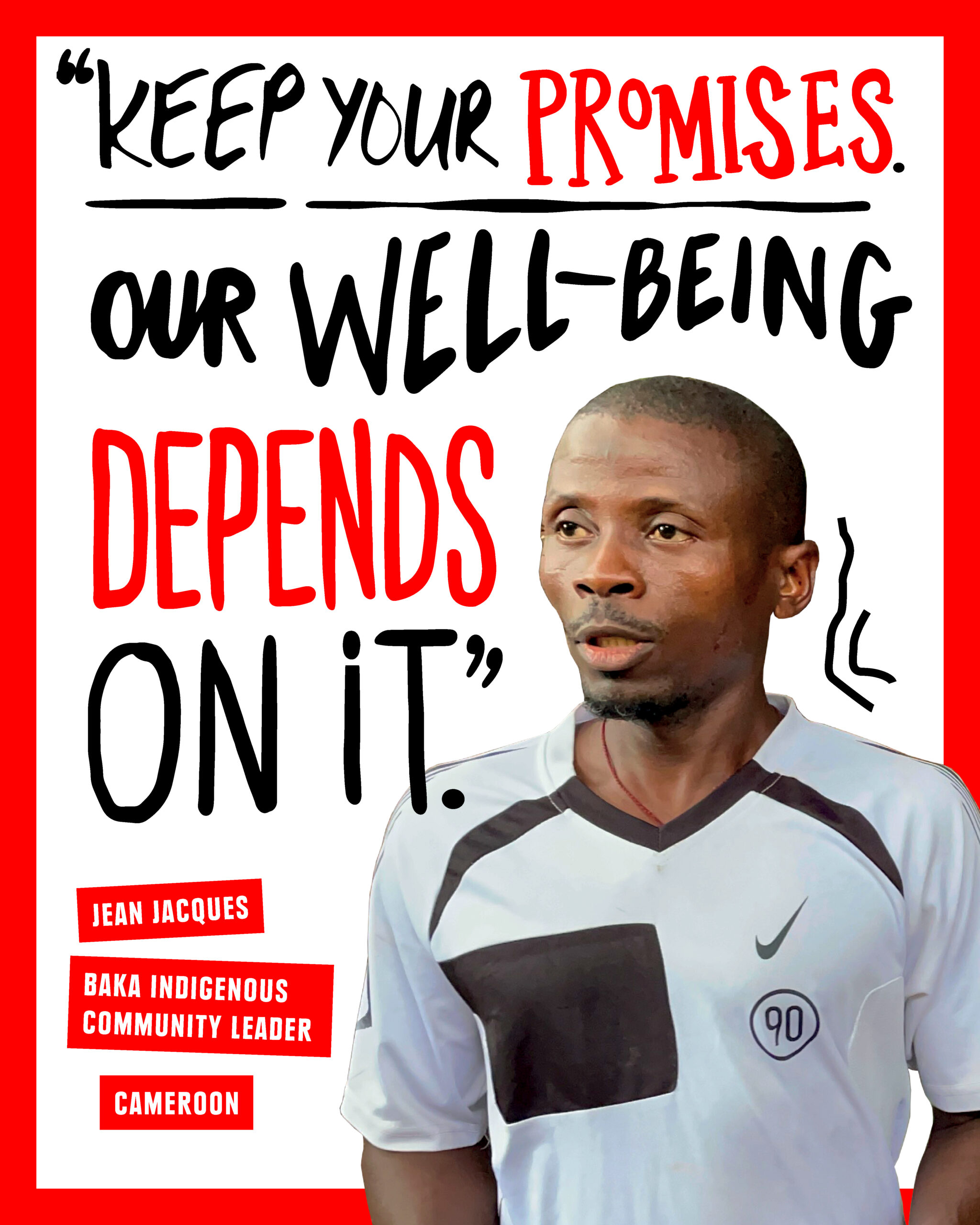 Eboe Eboe Jean Jacques is a Baka Indigenous Community Leader from the rainforests of Southern Cameroon.
Eboe Eboe Jean Jacques is a Baka Indigenous Community Leader from the rainforests of Southern Cameroon.Mya-Rose Craig aka Birdgirl
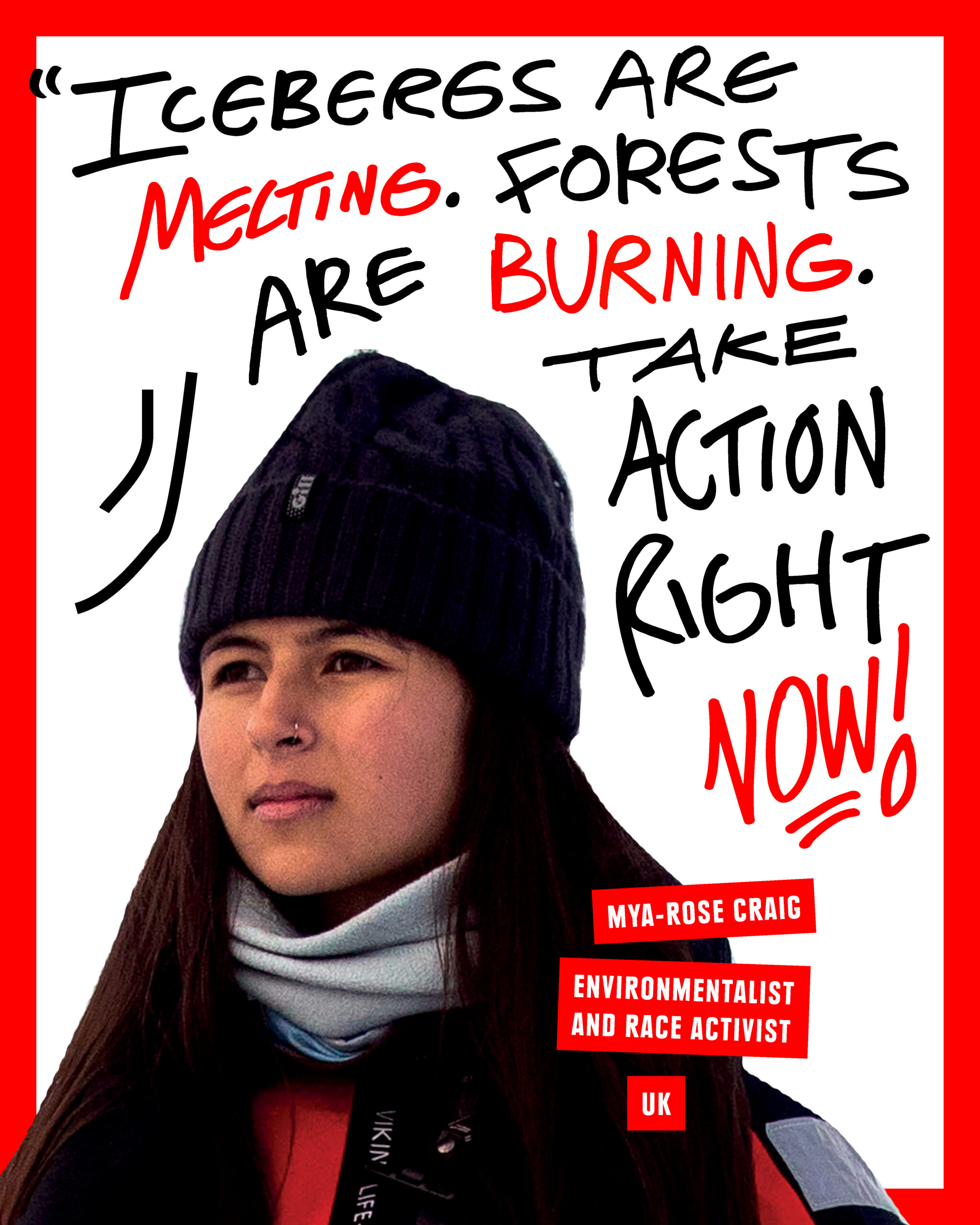 Mya-Rose Craig is an environmental and race activist from Bristol, UK. She has recently written a book, We Have A Dream, in which she highlights 30 young environmentalists from around the globe.
Mya-Rose Craig is an environmental and race activist from Bristol, UK. She has recently written a book, We Have A Dream, in which she highlights 30 young environmentalists from around the globe.John Ronneth
Luna Sakata
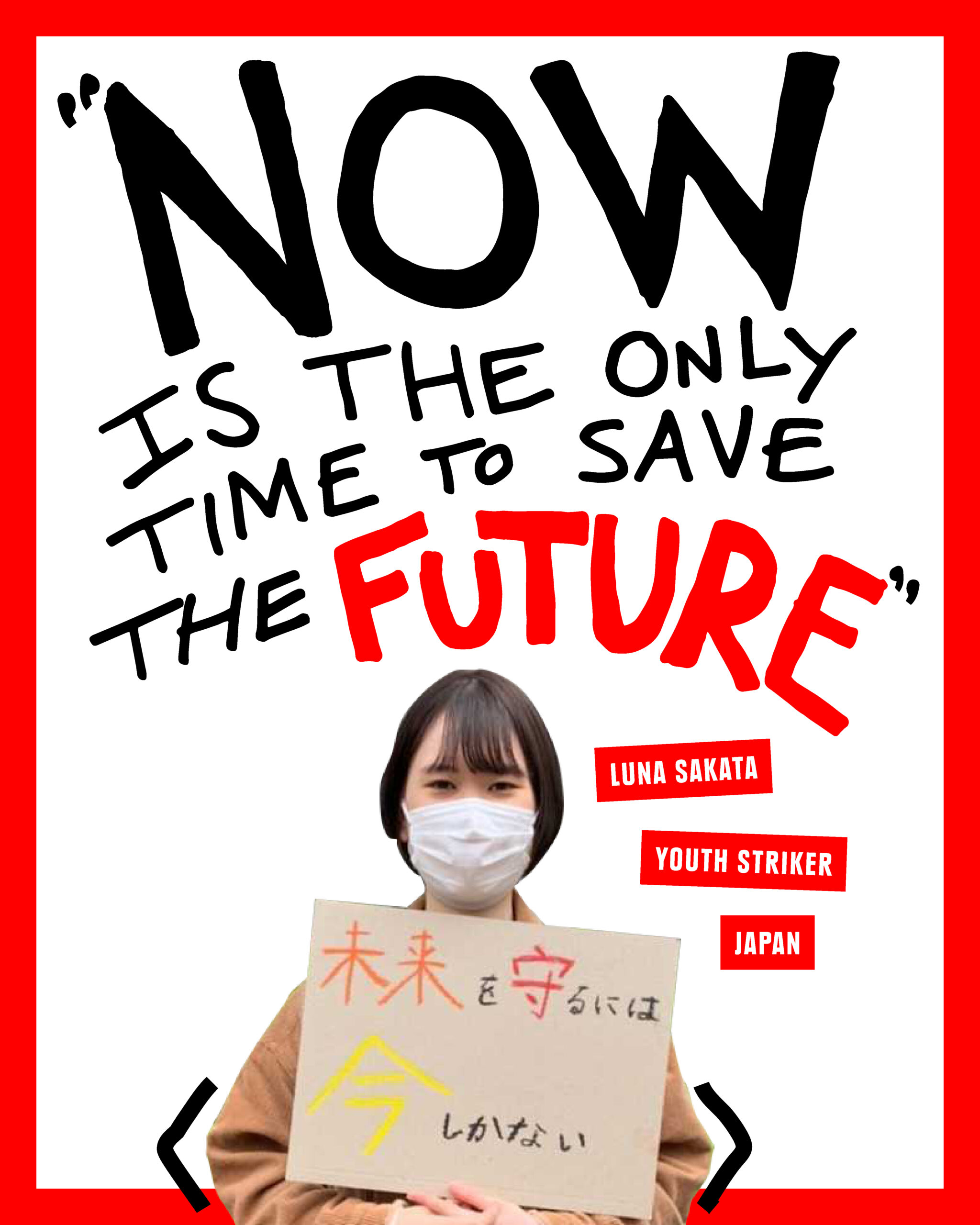 Luna Sakata is a youth climate striker with Fridays For Future, Tokyo.
Luna Sakata is a youth climate striker with Fridays For Future, Tokyo.Marie Thérèse Manzouer
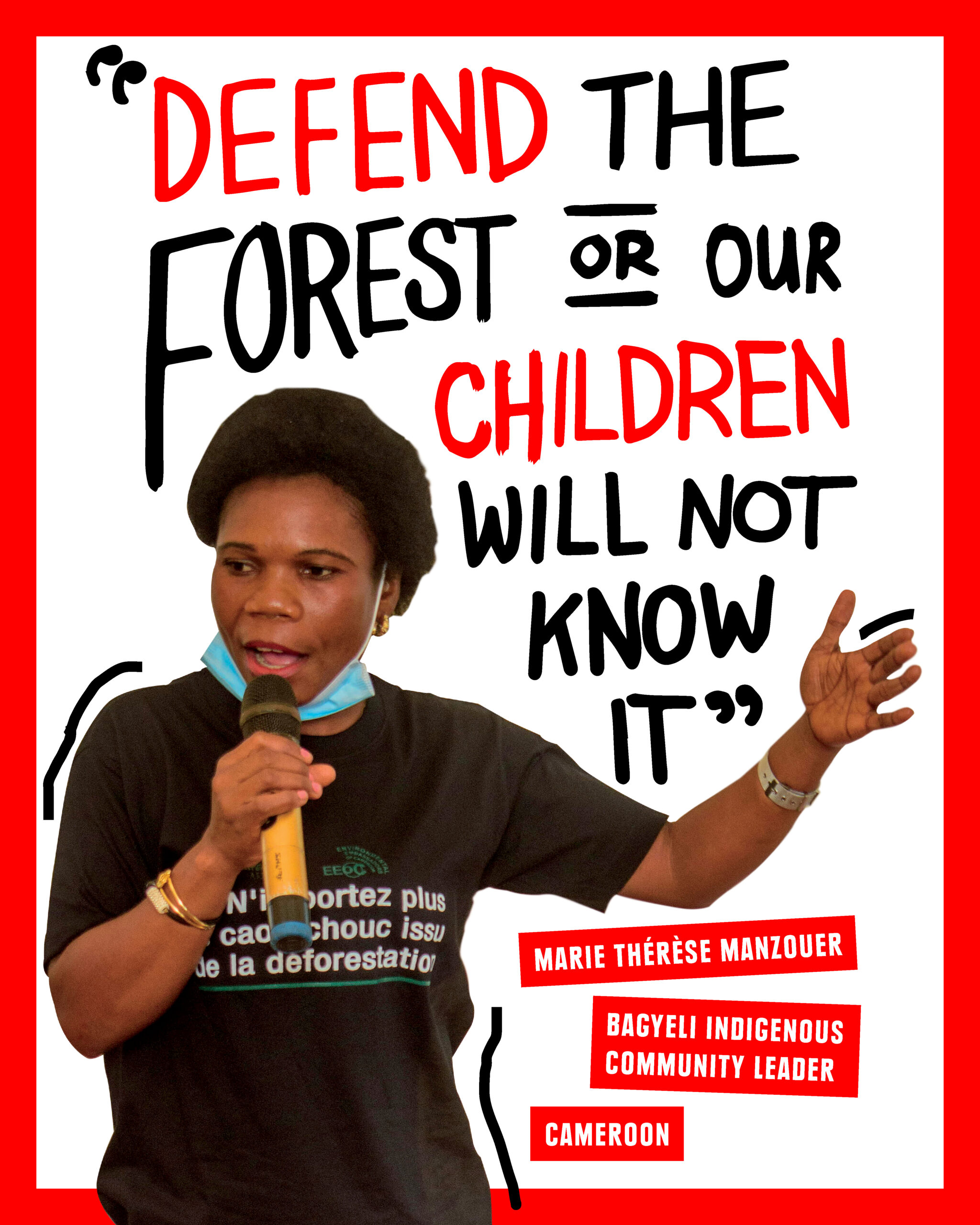 Marie Thérèse Manzouer is a Bagyeli Indigenous Community Leader from the rainforests of Southern Cameroon.
Marie Thérèse Manzouer is a Bagyeli Indigenous Community Leader from the rainforests of Southern Cameroon.Ray Lei
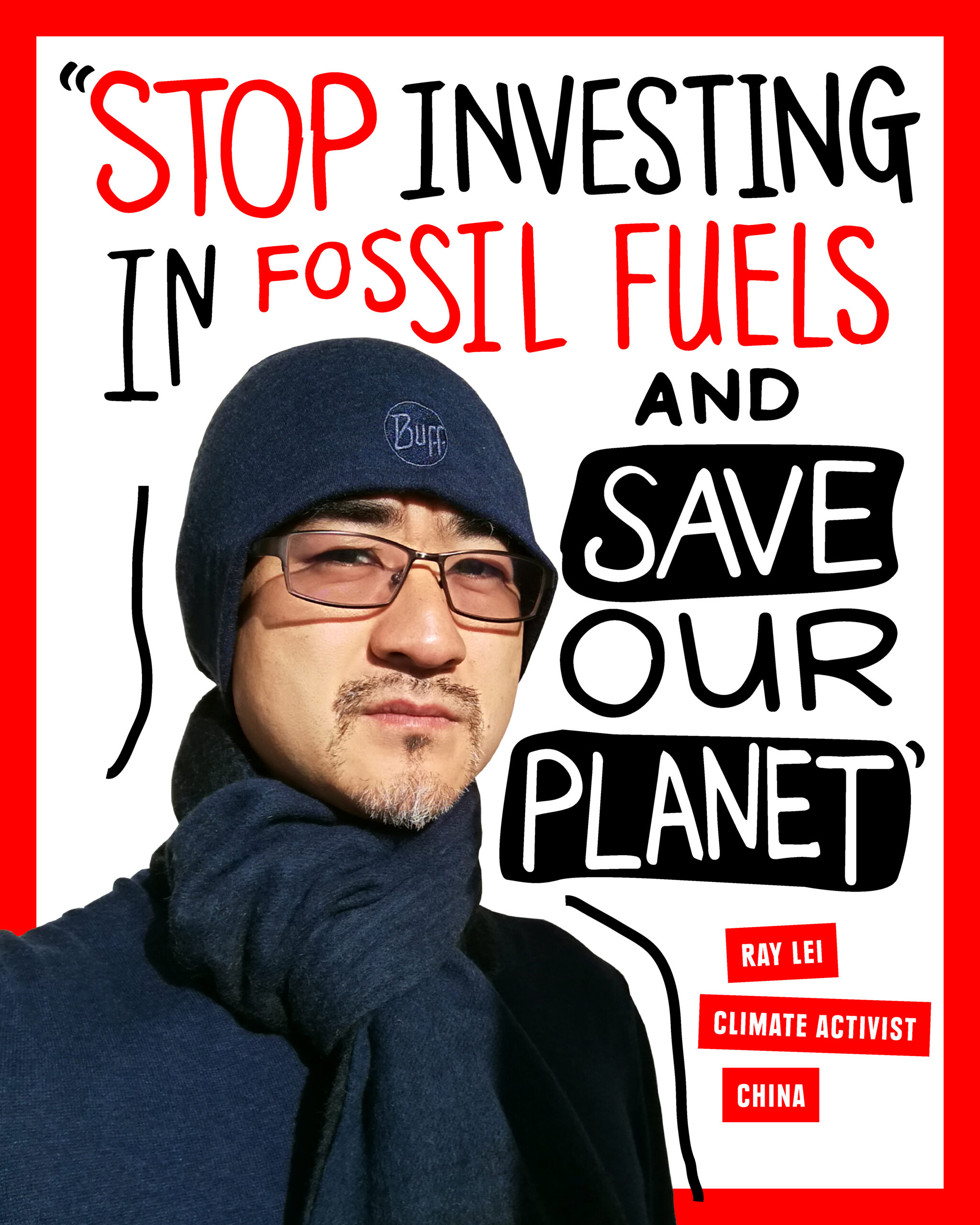 Ray Lei is a climate activist from Chongqing City, south-west China.
Ray Lei is a climate activist from Chongqing City, south-west China.Stuart Eves
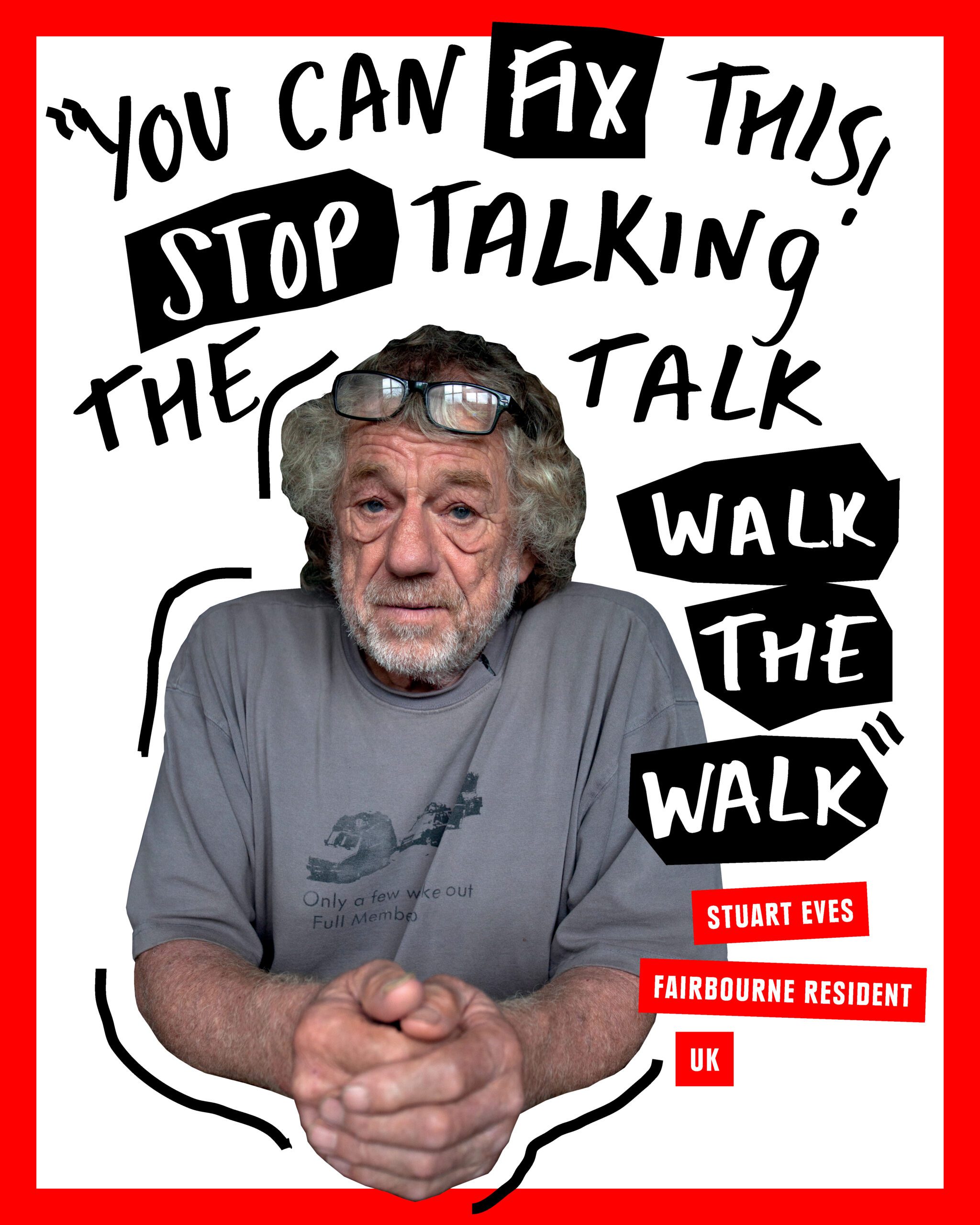 Stuart Eves is a resident of the first place in the UK to be lost to climate change – Fairbourne on the northwest coast of Wales.
Stuart Eves is a resident of the first place in the UK to be lost to climate change – Fairbourne on the northwest coast of Wales.Waya Maweru
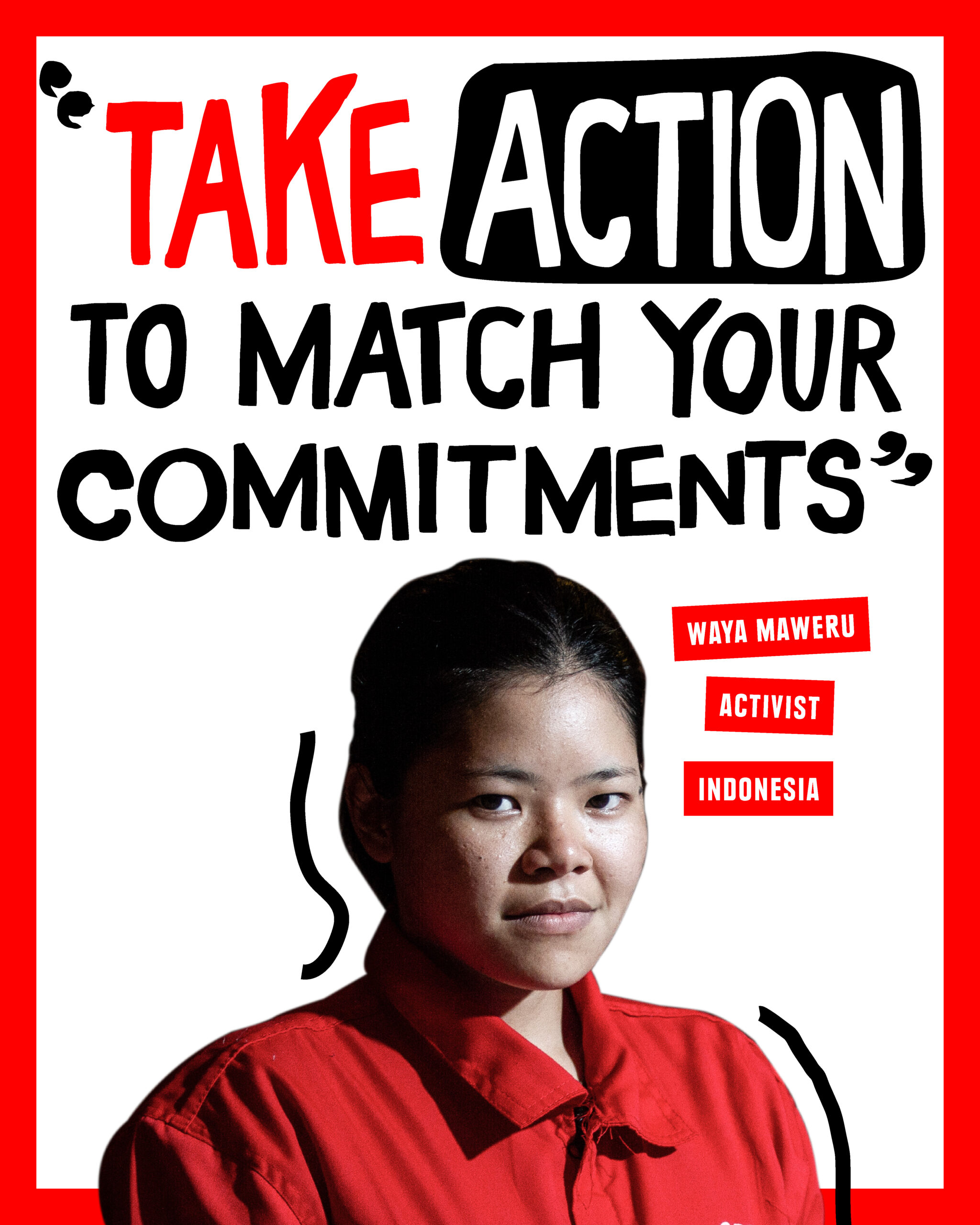 Waya is a Greenpeace activist from Indonesia who has worked to stop palm oil companies from destroying Indonesia’s rainforests.
Waya is a Greenpeace activist from Indonesia who has worked to stop palm oil companies from destroying Indonesia’s rainforests.
Slava Doroshuk
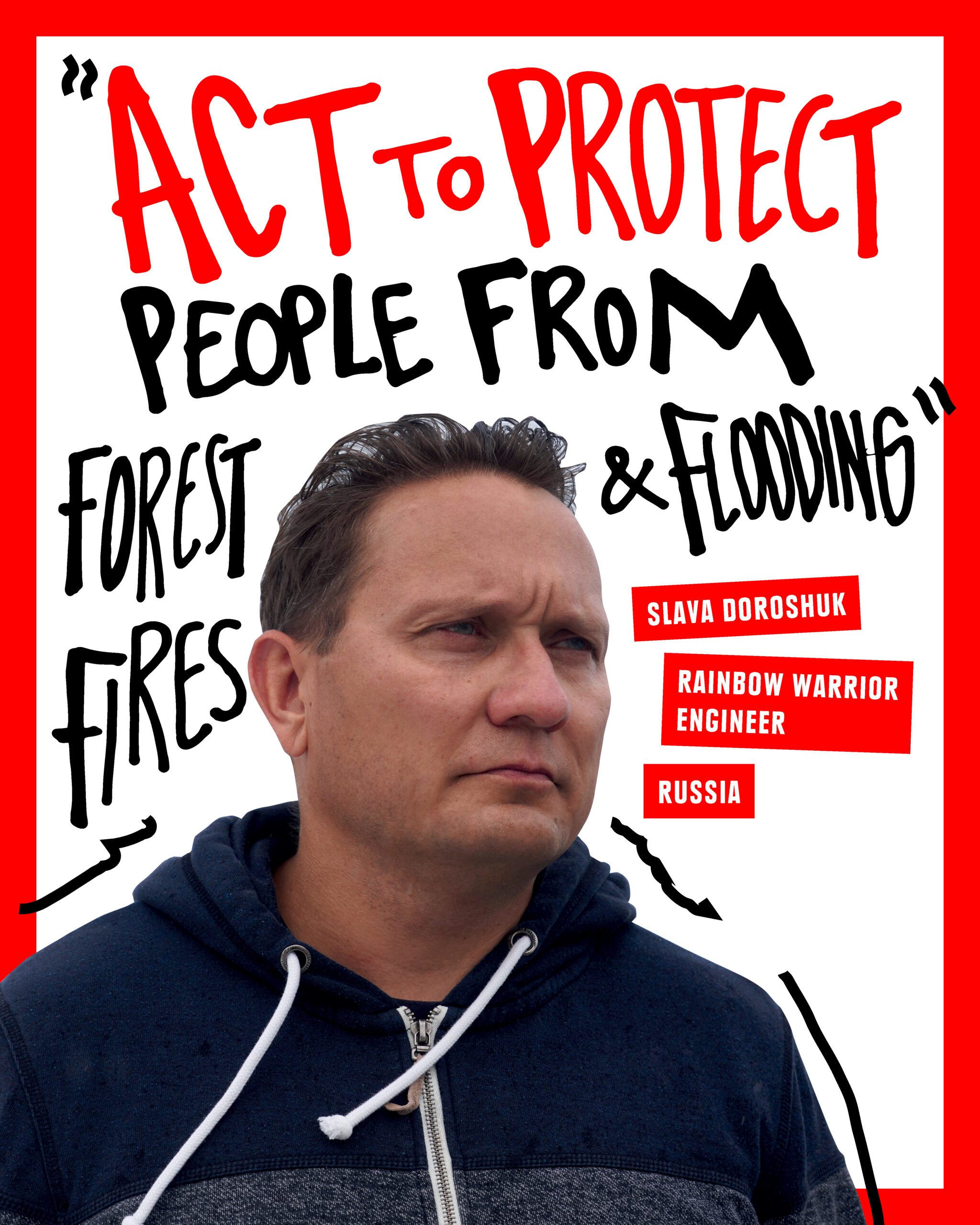 Slava Doroshuk is an engineer on the Greenpeace ship, the Rainbow Warrior.
Slava Doroshuk is an engineer on the Greenpeace ship, the Rainbow Warrior.

